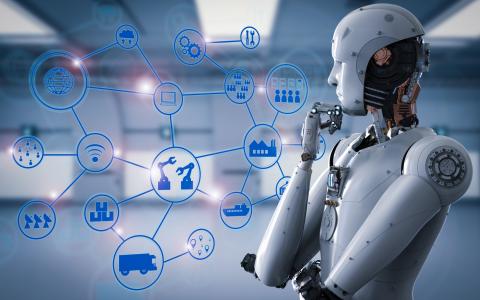
For the doomsayers, AI might as well be code for "impending mass unemployment."
Yet I believe that the adoption of AI isn't about replacing workers but rather helping them do their jobs better and about augmenting human creativity and potential at a massive scale.
We use the term augmented intelligence to describe how normal human intelligence is supplemented through the pairing of people and machines.
Traditional computer programs are programmed by humans to perform specific tasks like computation, estimation, etc.
Today’s bots rely on humans to train them, but this will change. Augmented intelligence systems will self-learn from data, actions and human feedback and can program themselves to perform new tasks or provide new ideas and support complex decision-making.
In a way, they enable a new class of "sixth sense" applications that intelligently detect and learn from relevant data and events and offer insights, prediction and advice instead of waiting for commands.
Context: Technology-Driven Workforce Dislocation
Every time in history that a new technological advance has come along, the fear that machines will replace humans has surfaced, but that is inconsistent with the evidence of what actually happened.
AI will drive new cycles of technology-driven worker displacement and will dislocate many routine and mundane physical activities and those around data gathering and processing.
According to a McKinsey study cited in the Harvard Business Review, "Currently, less than 5% of occupations are entirely automated, and about 60% of occupations have at least 30% of tasks that can be automated. Based on these estimates, there is considerable potential for the spread of advanced automation."
AI will also create many jobs that don’t exist today.
Now, we have digital marketers who are part of every enterprise trying to grow through digital channels.
These jobs did not exist in the late 90s when the internet did not exist. Nobody predicted that this new job would appear and it wasn't clear until the technology and its implications became mainstream.
A study from CognitiveScale parter Cap Gemini found that four out of five organizations that deployed AI systems have created more jobs, and over two-thirds of the organizations surveyed reported no reduction in jobs.
Impact: Unleashing Human Creativity And Potential
In financial services, I believe that every job will be impacted by AI.
AI will transform the financial industry at a scale much larger than what spreadsheets and the web did a few decades ago.
A study by Boston Consulting Group (BCG), a CognitiveScale partner, cited in Next Big Future found that "23% of the total 9.93 million jobs in the country’s banking, insurance and securities sectors will be affected, with entry-level staff engaged in repetitious daily operations bearing the brunt of any cuts."
Financial services workers will leverage machines to augment decision making and the customer experience and will continue to excel over machines in a variety of skills like creativity, interpersonal relationships and emotional dexterity to name a few. This will lead to the creation of new jobs and opportunities.
We talk about the white-collar knowledge worker and the blue-collar industrial worker today. We will see the emergence of new collar roles that leverage market and client expertise with technology as well as with soft skills to design, develop, deploy and ensure trust and compliance from AI-powered business systems.
These systems will transform client engagement and loyalty, augment decision making and drive operational excellence across capital markets, assets management, banking and insurance to name a few.
The emergence of data scientists and data engineers in the last few years who would look at gaining value out of data and design algorithms to apply AI techniques is an example. In the future, more nontechnical parts of the business will also see this emergence of new jobs.
To take advantage of AI techniques and embrace and nurture these new-collar workers, organizations must embrace machine learning and build the talent bench now.
They need to get these teams to gain hands-on learning from piloting and scaling AI-powered business processes.
They should also begin collaborating with regulators and policymakers on how best to implement responsible AI systems that are explainable and governable with visibility, trust and assurance.
The financial services industry is undergoing a transformation that will completely transform economies, labor markets and societal well-being.
It is also one of the most complex industries. The power of AI in evolving the next avatar of the financial services industry is very clear and will require organizations to work together and foster the environment they need to be successful.



